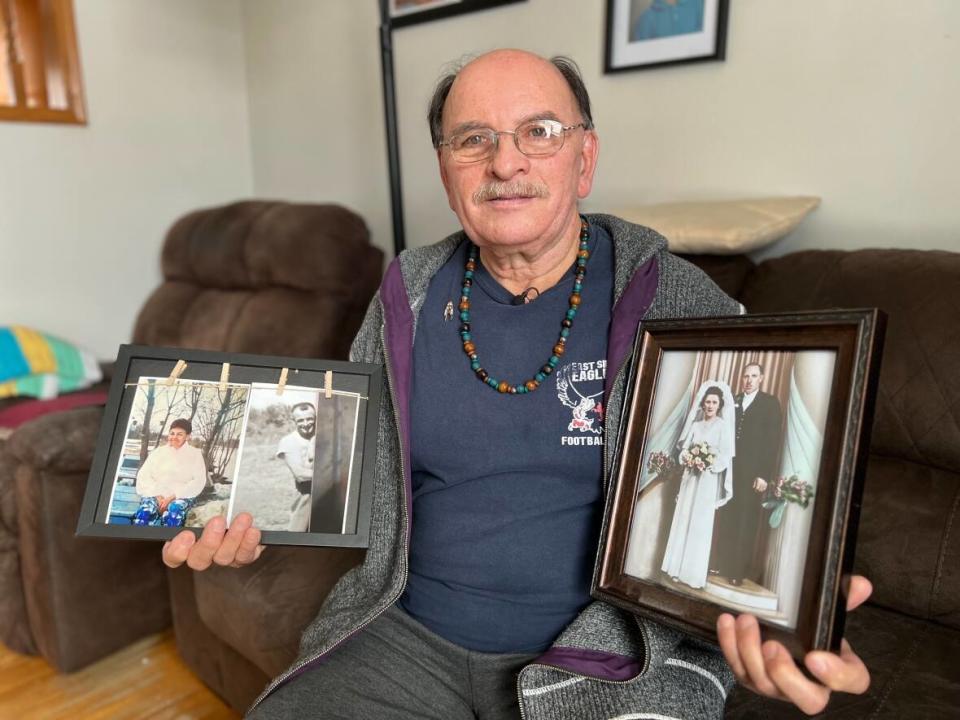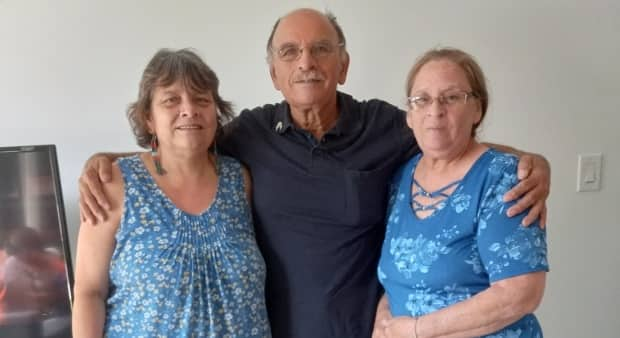Switched at birth at a Manitoba hospital over 60 years ago, 2 men seek answers, compensation from province

After learning they were switched at birth at a Manitoba hospital over 60 years ago, two men are looking for answers and compensation from the province.
Last year, Edward Ambrose got a call from his sister, who broke some surprising news to him. Through a 23 and Me DNA test, she had learned that Ambrose was not her biological brother.
Instead, she discovered a brother of hers living in British Columbia. Richard Beauvais was born on the same day and at the same Arborg, Man., hospital as Ambrose in 1955.
"I wasn't ready for that. It was a shock to me," Ambrose told CBC. "It [hurt], like there was something ripped out of me."
Ambrose was raised on a farm in Rembrandt, Man., with a Ukrainian family and had a close relationship with the man he now calls his "bonded" father. Looking at pictures of the family he grew up with, Ambrose said he could not see himself not being a part of them.
"Growing up all these years with them — you're a family," he said.
'We didn't believe it'
Beauvais, however, lived a much different life. Raised Métis, Beauvais is a residential day school survivor who was taken away from his family in the Sixties Scoop.
He was shocked to learn that he was not of Cree and French descent, as he had believed his whole life, but is actually of Ukrainian, Jewish and Polish ancestry.
"At the beginning, we didn't believe it," Beauvais told CBC.
"I came from a time where it was shameful to be an Indian," he said. "I felt I lost something, because when you fight so hard to be somebody, and all of a sudden you're not that person — it sets you back."

The experience has been like a roller-coaster, he said.
"It was very emotional for me to phone my sisters and tell them I'm not their brother. That was hard."
The two men are working with a lawyer. They want an apology and compensation for what they went through.
Their lawyer, Bill Gange, told CBC he made that request to the province in April 2022. He received a response from its lawyer in December, saying the province had no legal liability in the situation and that it would not offer the men any compensation.
This isn't the first case of children being switched at birth in Manitoba. Two other sets of men from northern First Nations found out they were switched at the federally-run Norway House Indian Hospital in 1975.
Health Canada investigated both of those cases, and two of the men received financial settlements as well as support services from Ottawa.
Province response 'shameful'
In an email to CBC, a representative of the Interlake-Eastern Regional Health Authority said it was not able to comment due to personal health information privacy legislation. The province has not responded to CBC's request for comment.
Beauvais says he doesn't blame anyone for the mix-up at the hospital, but called the province's response "terrible."
"I think it's shameful that the government won't at least try to help us straighten this out," he said. "The lawyer has to fight for every square inch we get."
As a nation, our hearts are with all the people involved in this heartbreaking case. - Manitoba Métis Federation president David Chartrand
Because he was presumed to be Indigenous, Beauvais said he experienced things that should never happen to anyone.
"There were times that he had to go into the garbage dumps and look for food to help feed his sisters," said Ambrose, adding that Beauvais was punished for speaking his language at the school he attended.
While Beauvais is dealing with the loss of his Indigenous identity, Ambrose is picking up the pieces of his.
He hopes he and his daughter can become recognized citizens of the Manitoba Métis Federation, but he said he's not getting the help he needs from the province to change his birth certificate.

In a statement to CBC, federation president David Chartrand said he cannot imagine the psychological harm both Ambrose and Beauvais have suffered.
"As a nation, our hearts are with all the people involved in this heartbreaking case," he said. The MMF has a Sixties Scoop department and wellness centre that can offer support to victims of cases like theirs, said Chartrand.
Ambrose said his bonded father would have taken both of the boys into his care, had he known what Beauvais would go through.
He's now getting to know his new sisters, Leona and Valerie, although Ambrose said he'd already previously met Valerie at a school in Stonewall.
"They didn't choose her [for baseball], so I felt bad about it. So I told our team that we're going to take her."

While he was provided with photos of his biological sisters by Beauvais, Ambrose said meeting them in person was a different experience.
"When you see them in person, then you start recognizing yourself," he said. "She's got my cheeks. She's got my face features, my ears. She's my sister."
Neither man got the chance to meet their biological parents, all of whom are no longer alive. Ambrose said those experiences were taken from him.
"Seeing my sisters, I see mom and dad," he said. "That's the only memory I'm going to have, and whatever they're going to tell me about them, that's all I have."
Both he and Beauvais lost 67 years of their lives, he said. And after so much loss, they're getting to know each other and their biological families.
But Beauvais said action from the province is needed in order for both of the men to move forward.
"We can't do anything about the years we lost, but they should give us our future back."
WATCH / Men switched at birth in Manitoba demand accountability:

